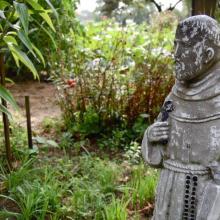eternal life
RARELY DO YOU see powerful people advocate for the benefit of others outside their “own” political or economic group. There is a tendency on the part of the elite to leverage their privilege for their own benefit while disguising it as public good, as the concept of “elite capture” has exposed. And the state is often complicit in reinforcing policies and practices that concentrate resources into the hands of those who already have enough. In a 1962 sermon titled “A Knock at Midnight” (see Luke 11:5-6), Martin Luther King Jr. diagnosed the state of the nation and church saying, “It is midnight in the social order.” He urged the church to respond to the oppressed who “knock on the door,” even when it’s inconvenient. “How often has the church left [people] disappointed at midnight, while it slept quietly in a chamber of pious irrelevancy,” preached King.
Despite decreasing numbers, the U.S. church wields enormous political and economic power. This month’s readings showcase people — the powerful and the not so powerful — who exercise their agency for the good of those who seemingly have little to offer in return. The texts highlight the church’s moral and theological imperative to employ its power to open the door to the ones who desperately knock. Will the church that gathers in the name of Jesus ignore the state’s complicity in oppressive structures or will it act as the “conscience of the state,” as Dr. King urged? Does the church privilege its own comfort or does it attend to the vulnerable, even at the risk of its own interests? King concluded, “the greatest challenge facing the church today is to keep the bread fresh and remain a Friend to [humanity] at midnight.”
CALEB WILDE is familiar with death. He is the descendant of two long-term generational funeral home families and went into the funeral industry himself. His first book, Confessions of a Funeral Director, delved into some of the more uplifting stories he’s had in death care. His latest book, All the Ways Our Dead Still Speak, is more introspective.
The early chapters detail a few death experiences — an atheist seeing the dead parents of her husband as he dies, for instance — and at first, that’s what I thought the book would be about: exploring what people’s deathbed visions meant to them, regardless of whether those visions were real. But for Wilde, that’s missing the point. What matters is that the dead are still speaking to us. Death isn’t necessarily an end, Wilde argues — it’s a transformative experience; the living carry inside us the essence and dreams of the dead. Open conversations about death and dying can lead to a healthier society.
Wilde specifically calls out white people, his ancestry and mine, for being disconnected from their ancestors. He cites the difference between the polite, private, quiet funerals of white people versus the communal, intensive, emotional funerals of Black people. Many white people believe that grief is a personal, private journey. However, in many Black families and cultures all over the world, grief is a communal process. People come together to remember, love, and support each other. In these times, they cease to become individual selves and instead focus on the plural self — on community: A community of people both dead and alive.
Oddly enough, whenever I think about eternal life, Animal Collective come to mind.
That might — well, almost certainly will — need some clarification because, as many Christians might be quick to point out, shouldn’t Jesus be the first person that comes to mind, or maybe living on some clouds in a golden city or something?
Yes and no. What comes to mind when I think about eternal life is painted by Frederick Buechner’s entry on the subject in his book Wishful Thinking, which I studied for a class in college. Buechner takes religious terms and eloquently and poetically explores what they might mean.
My friend Mike died last week.
We were the same age. We grew up together in Marinette in northeast Wisconsin. Worked our way through Boy Scouts together. Played at each other’s houses. Studied in the same classrooms. And then, over time, we drifted apart. Until this past year. That’s when I learned that Mike was dying of cancer.
In less than 12 months, we re-established a friendship and Mike and his wife, Nancy, taught me amazing lessons about living with the prospect of dying.
In our initial contacts, Nancy wrote of Mike:
“He is doing well with his treatments. I am amazed, each day, how well he handles this journey we are on. Never once have we asked ‘why us?’ We feel so blessed that we have each day to love each other and enjoy our retirement one day at a time. Not everyone is so lucky to have a long goodbye with the one they love.“
Jesus said to them, Very truly, I tell you, whoever believes has eternal life. I am the bread of life. - John 6:47-48
When I was in my 20s and totally out of control and pretty much estranged from my conservative Christian parents I used to joke about how my mom would try and guilt me into connecting with them more often by saying in her Kentucky accent “Nadia, the least you could do is come visit us more often … since we won’t be spending eternity together." Which made me wonder if the church she went to realized that the promise of spending eternity with my mom and her friends wasn’t exactly the best-selling point. At least not for a 21 year old.*
But that’s kind of what I was taught: that being a Christian was all about where you will spend eternity after you die – kind of like purchasing a life-insurance plan for the hereafter. And if you manage to be good enough here on earth then when you die you get to go to heaven and be like the spiritual 1 percent for eternity and live in big mansions with Jesus and wear awesome jewels and walk streets of gold.
Which made it sound like eternal life is basically about getting to live like Liberace Forever.
Today (Oct. 4) Christians around the world celebrate the life of St. Francis of Assisi, one of the bright lights of the church and one of the most venerated religious figures in history.
The life and witness of Francis is as relevant to the world we live in today as it was 900 years ago. He was one of the first critics of capitalism, one of the earliest Christian environmentalists, a sassy reformer of the church, and one of the classic conscientious objectors to war.





